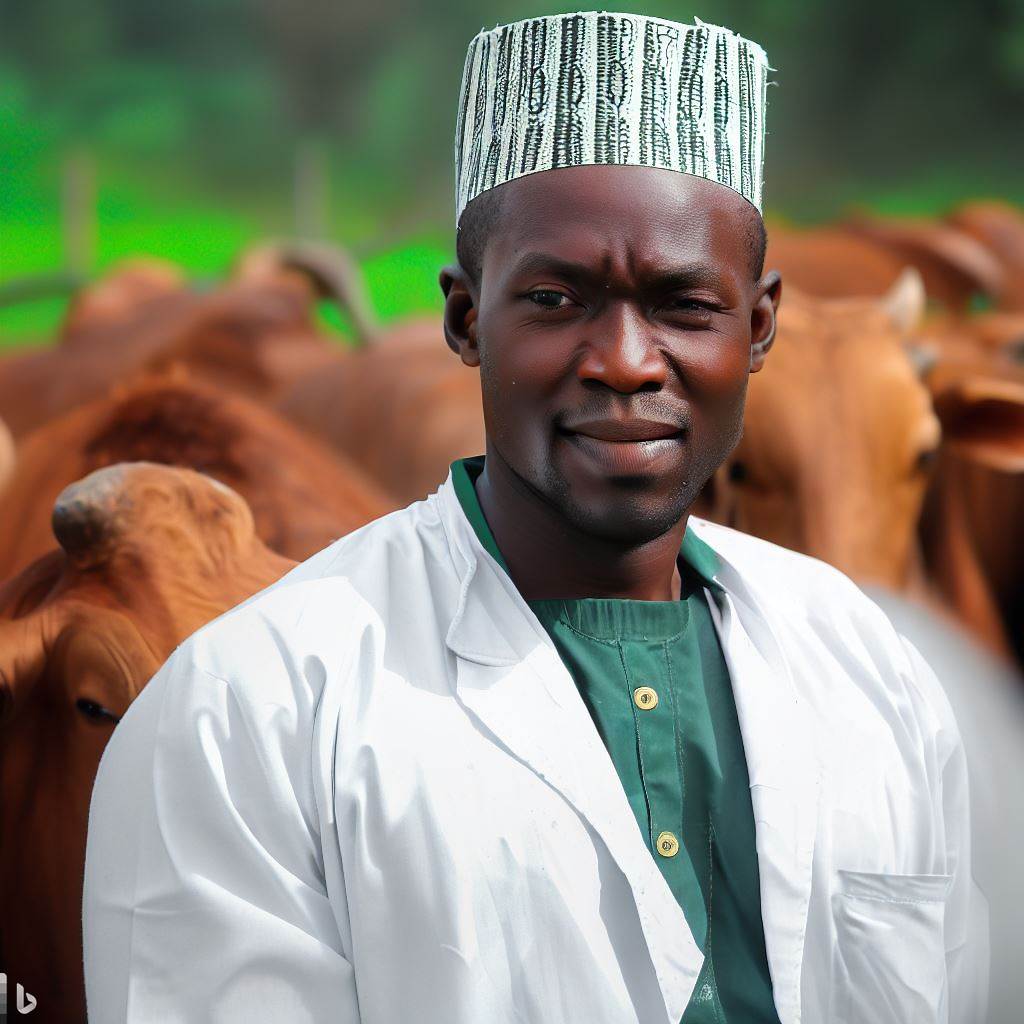Introduction
Nigerian animal geneticists are true experts in their field, dedicated to studying and enhancing the genetic makeup of livestock.
This expertise is of paramount importance because the livestock industry holds a central position in Nigeria’s economy and food security.
By meticulously examining and manipulating the genetic composition of livestock, these specialists contribute to the industry’s growth and sustainability.
They work towards developing breeds that are not only more productive but also resilient to diseases and environmental challenges, ensuring a stable food supply for the nation.
As we delve deeper into the world of Nigerian animal geneticists, we will uncover their groundbreaking research, innovations, and the pivotal role they play in shaping the future of the country’s livestock sector.
Significance of Nigerian Animal Geneticists in Livestock Improvement
Nigerian animal geneticists play a vital role in the improvement of livestock, bringing advancements in breeding techniques and enhancing the productivity and quality of animals.
Advancements in breeding techniques
Nigerian animal geneticists have introduced innovative breeding techniques that have transformed the livestock industry.
- Introduction of artificial insemination: By implementing artificial insemination, geneticists have facilitated controlled breeding, resulting in the production of high-quality offspring.
- Implementation of selective breeding strategies: Through selective breeding, geneticists have been able to focus on desirable traits, such as increased milk production or disease resistance, leading to improved livestock populations.
These advancements have revolutionized the livestock sector in Nigeria, providing farmers with access to superior breeds and increasing the overall efficiency of animal production.
Enhanced livestock productivity and quality
Through their efforts, Nigerian animal geneticists have significantly enhanced livestock productivity and improved the quality of meat and dairy products.
- Increased milk and meat production: By selectively breeding animals with high milk and meat production potential, geneticists have contributed to higher yields and improved economic returns for farmers.
- Improvements in disease resistance: Nigerian animal geneticists have successfully bred livestock with enhanced disease resistance, reducing the susceptibility of animals to common ailments.
This has decreased the need for excessive medical interventions, leading to both cost reductions and improved animal welfare. - Enhanced adaptability to local environmental conditions: By selectively breeding animals that can thrive in the local climate, geneticists have increased the resilience and adaptability of livestock species. This has resulted in decreased mortality rates and improved overall animal health.
These achievements have positively impacted the livelihoods of Nigerian farmers, allowing for greater agricultural productivity and a more sustainable livestock industry.
In essence, Nigerian animal geneticists have made significant contributions to livestock improvement.
Through advancements in breeding techniques, they have introduced artificial insemination and implemented selective breeding strategies.
These efforts have enhanced livestock productivity, improving milk and meat production, disease resistance, and adaptability to local environmental conditions.
The impact of Nigerian animal geneticists is instrumental in meeting the growing demand for high-quality livestock products and promoting the sustainable development of the livestock industry in Nigeria.
Read: Exploring the Profitability of Farming in Nigeria
Contributions to Sustainable Livestock Production
Development of sustainable breeding programs
- Nigerian animal geneticists have played a crucial role in the development of sustainable breeding programs.
- These programs aim to improve the genetic potential of livestock for better productivity.
- By selecting superior animals for breeding, geneticists have enhanced traits like growth rate, milk production, and disease resistance.
Preservation of indigenous livestock breeds
- Nigerian animal geneticists recognize the value of preserving indigenous livestock breeds.
- These breeds have adapted to local conditions and possess unique characteristics.
- Geneticists have focused on identifying and conserving these breeds to maintain genetic diversity.
Promotion of sustainable animal management practices
- Nigerian animal geneticists advocate for proper nutrition and feed management in livestock production.
- They understand the importance of providing balanced diets to optimize animal health and productivity.
- Through research and education programs, geneticists have disseminated knowledge on efficient feeding practices.
- Disease prevention and control is another area where Nigerian animal geneticists have made significant contributions.
- They have worked on developing vaccines and diagnostic tools to identify and combat various livestock diseases.
- By implementing proper disease control measures, geneticists have minimized the economic losses associated with outbreaks.
- Genetic diversity preservation is crucial for sustainable livestock production.
- Nigerian animal geneticists have studied and conserved genetic variations within and between livestock breeds.
- This helps maintain resilience in the face of environmental changes and challenges.
- Basically, Nigerian animal geneticists have made substantial contributions to sustainable livestock production.
- Their development of breeding programs, preservation of indigenous breeds, and promotion of animal management practices have significantly improved the sector.
- Through their efforts, livestock farmers can enhance productivity, maintain genetic diversity, and ensure the long-term sustainability of the industry.
Read: Understanding the Market Structure of a Nigerian Farmer

Economic Impact on Livestock Industry
The impact of Nigerian animal geneticists on the livestock industry has been significant in terms of economic growth and development.
Through their research and practices, they have contributed to increased revenue generation and job creation, thereby positively influencing the overall industry.
Increased revenue generation
One of the key economic impacts of Nigerian animal geneticists on the livestock industry is the increased revenue generation.
This has been achieved through the expansion of meat and dairy exports.
Nigerian animal geneticists have played a crucial role in improving the quality and productivity of livestock, resulting in higher exports of meat and dairy products.
This has not only led to increased revenue for the industry but has also contributed to the country’s overall economic growth.
In addition to increased exports, the work of Nigerian animal geneticists has also enhanced the competitiveness of the country’s livestock industry in the global market.
By implementing advanced breeding techniques and genetic improvements, Nigerian livestock products have become more desirable and competitive in international markets.
This has opened up opportunities for the industry to capture a larger market share and establish Nigeria as a significant player in the global livestock trade.
It has not only increased revenue but also boosted the country’s image as a reliable and quality supplier of livestock products.
Job creation and income generation
Another important economic impact of Nigerian animal geneticists is the creation of employment opportunities within the animal genetics sector.
The research and development activities carried out by these experts have resulted in the establishment of specialized laboratories, research centers, and breeding farms.
These facilities require skilled professionals, technicians, and support staff, thereby creating job opportunities for individuals interested in animal genetics.
This has not only reduced unemployment rates but has also contributed to the growth of a highly skilled workforce in the country.
Furthermore, the advancements in animal genetics have directly benefited livestock farmers by improving their livelihoods.
Through the application of genetic technologies, Nigerian animal geneticists have helped enhance the productivity and profitability of livestock farming.
By breeding animals with desirable traits such as high milk production, disease resistance, and better meat quality, farmers can improve their income and standard of living.
This has had a positive ripple effect on rural communities, as livestock farming plays a crucial role in their economic sustenance.
In fact, Nigerian animal geneticists have had a significant economic impact on the livestock industry through increased revenue generation and job creation.
Their contributions have expanded meat and dairy exports, enhanced competitiveness in the global market, and created employment opportunities within the animal genetics sector.
Moreover, the livelihoods of livestock farmers have improved, leading to overall economic development and growth in the country.
The work of Nigerian animal geneticists remains vital in ensuring the sustainability and profitability of the livestock industry in Nigeria.
Read: The Role of Farmer Cooperatives in Nigeria
See Related Content: Pioneers of the Farm Manager Profession in Nigeria
Challenges Faced by Nigerian Animal Geneticists
Limited Funding and Resources
- Insufficient financial support hampers research and development in animal genetics.
- Lack of funds restricts the acquisition of modern technologies and infrastructure.
- Inadequate resources hinder the ability to conduct extensive and comprehensive studies.
- Limited funding also affects the recruitment and retention of highly skilled professionals.
- Lack of investment in research and development slows down progress and innovation in the field.
Lack of Public Awareness and Support
- Widespread ignorance about the importance of animal genetics hinders support and funding.
- Public perception focuses more on traditional breeding methods rather than genetic improvement.
- Limited awareness about the potential benefits of genetic research for livestock production.
- Lack of public engagement leads to a lack of political will to allocate resources.
- Insufficient advocacy efforts fail to garner support from stakeholders and policymakers.
Regulatory Barriers and Policy Constraints
- Existing regulations may not be designed to address the specific challenges faced by geneticists.
- Complex bureaucratic processes and red tape delay research and development activities.
- Inconsistent or outdated policies hinder the adoption of new genetic technologies.
- Limited collaboration between relevant government agencies leads to fragmented policies.
- Absence of clear guidelines for genetic research and ethical considerations creates uncertainties.
All in all, Nigerian animal geneticists face numerous challenges that hinder their progress and impact in livestock improvement.
Limited funding and resources, including insufficient financial support, lack of modern technologies, and inadequate resources, pose significant barriers to conducting extensive research.
Additionally, the lack of public awareness and support, which is fueled by ignorance and misconception, contributes to a limited understanding of the benefits of animal genetics.
Regulatory barriers, including complex bureaucratic processes, outdated policies, and fragmented collaboration, also create hurdles for geneticists.
Overcoming these challenges requires increased funding, enhanced public education, and comprehensive policy reforms to support and empower Nigerian animal geneticists in their quest for livestock improvement.
Read: Success Stories: Inspiring Nigerian Farmer Entrepreneurs
Delve into the Subject: Challenges Faced by Livestock Producers in Nigeria
Future Prospects
Potential for further advancements in animal genetics research
Nigerian animal geneticists have already made significant contributions to the livestock industry, but there is still immense potential for further advancements.
With emerging technologies and innovative approaches, animal genetics research can continue to improve the breed quality, disease resistance, and productivity of Nigerian livestock.
Importance of continuous investment in scientific research
To harness the full potential of Nigerian animal geneticists, continuous investment in scientific research is crucial.
Adequate funding and resources will ensure that researchers can conduct thorough investigations, implement innovative strategies, and address pressing challenges facing the livestock industry.
Nigerian animal geneticists play a vital role in enhancing the livestock industry’s productivity, sustainability, and economic growth.
Their research and collaborations have led to the development of superior breeds, increased resistance to diseases, and improved overall livestock performance.
This has resulted in higher profitability for farmers, increased food security, and a boost to the national economy.
You Might Also Like: Fishing Industry Jobs: Exploring Nigeria’s Marine Wealth
Conclusion
Nigerian animal geneticists have made remarkable contributions to the livestock industry through their expertise, research, and collaborations.
With the potential for further advancements and continuous investment in scientific research, the impact of these geneticists is expected to grow, benefiting both farmers and the nation as a whole.




